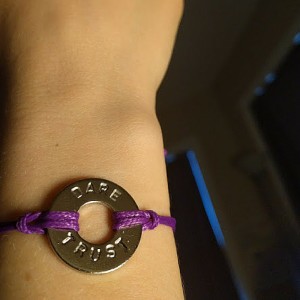It’s official — I’m breaking up with self-improvement.
If these words seem strange coming from a life coach, then allow me to clarify. I’m not breaking up with the coaching process or with my goal of living a better, truer, happier life. But I am breaking up with the idea that self-improvement is something we need to “do”.
If you’ve followed this blog for a while, then you know that I’m a sucker for a new idea. It’s an affliction that can be almost crippling in the modern era, when more new content is published on a daily basis than anyone could ever hope to keep up with.
For years now, I’ve been gamely trying to keep up with at least the ideas that seemed most important even though I knew I’d never be able to keep up with them all.
But somewhere along the way my intention got twisted. I started with clean curiosity and play, but eventually the sheer quantity of things I’d never know overwhelmed me and I found myself anxiously believing stories that weren’t true.
- The answer is out there, I just have to find it.
- I’ll never find what I’m looking for.
- I’ll never know everything I need to in order to be happy and successful.
- I’ll never be ready to start.
- I need to know more.
If you’ve ever lived with stories like these, then perhaps you already know they aren’t true. But I got so wrapped up in my hunt for the answers that I wound up with blinders on.
Which is why I’m breaking up with self-improvement.
Because the answers I need aren’t in some book, or the next email newsletter from some thought leader, or some blogger’s YouTube video.
As Lao Tzu wrote in the Tao Te Ching,
In the pursuit of knowledge,
every day something is added.
In the practice of the Tao, [also translated as “in the pursuit of wisdom”]
every day something is dropped.
Less and less do you need to force things,
until finally you arrive at non-action.
When nothing is done,
nothing is left undone.
Mitchell, Stephen (2009-10-13). Tao Te Ching (Perennial Classics) (p. 54). HarperCollins. Kindle Edition.
Although I love knowledge and knowing things, my true fascination has always been with wisdom.
When I seek wisdom over knowledge I find that the answers are waiting for me in my own heart, my own truth, my own integrity — not waiting for me outside in someone else’s books.
I already have my answers. I just need to stop searching for them long enough time realize they’re already waiting for me.
You already have your answers, too. Even when it doesn’t feel like it — especially when it doesn’t feel like it.
All you have to do is listen.
This is so, so important because all those things I listed at the beginning: that better, truer, happier life you’re looking for — the instructions for creating that life aren’t in any book.
And as long as you remain busy looking for answers from the outside, you remain blind to the answers already waiting for you on the inside.
The path to peace, joy, gratitude, and all good things doesn’t lead out into the world.
Instead, it leads deep into the wild depths of your heart — the dark and mysterious places you’ve been afraid to linger.
Peace comes when you realize your dark and shame-filled places are what make you complicated, beautiful, and capable of immense compassion.
Joy comes when you realize how outrageously lucky you are to be here, now.
Gratitude comes when you still the frightened, ravening voice in your head that needs more, more, more in order to feel safe.
The path to wholeness and healing is an inside job. It happens when you turn to look inside and face into the answers that are already waiting for you.
Remember — enlightenment is the journey, not the destination.
Much love,
Jessica
P.S. If you’d like some extra support on this journey, I invite you to work with me as a private coaching client.
Disclaimer: This post contains Amazon affiliate links. I make a (very) small referral commission from purchases made using my links. This does not affect your price.

